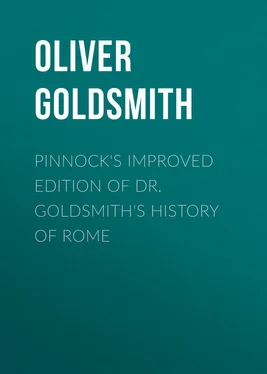Oliver Goldsmith - Pinnock's improved edition of Dr. Goldsmith's History of Rome
Здесь есть возможность читать онлайн «Oliver Goldsmith - Pinnock's improved edition of Dr. Goldsmith's History of Rome» — ознакомительный отрывок электронной книги совершенно бесплатно, а после прочтения отрывка купить полную версию. В некоторых случаях можно слушать аудио, скачать через торрент в формате fb2 и присутствует краткое содержание. Издательство: Иностранный паблик, Жанр: foreign_antique, foreign_prose, на английском языке. Описание произведения, (предисловие) а так же отзывы посетителей доступны на портале библиотеки ЛибКат.
- Название:Pinnock's improved edition of Dr. Goldsmith's History of Rome
- Автор:
- Издательство:Иностранный паблик
- Жанр:
- Год:неизвестен
- ISBN:нет данных
- Рейтинг книги:4 / 5. Голосов: 1
-
Избранное:Добавить в избранное
- Отзывы:
-
Ваша оценка:
- 80
- 1
- 2
- 3
- 4
- 5
Pinnock's improved edition of Dr. Goldsmith's History of Rome: краткое содержание, описание и аннотация
Предлагаем к чтению аннотацию, описание, краткое содержание или предисловие (зависит от того, что написал сам автор книги «Pinnock's improved edition of Dr. Goldsmith's History of Rome»). Если вы не нашли необходимую информацию о книге — напишите в комментариях, мы постараемся отыскать её.
Pinnock's improved edition of Dr. Goldsmith's History of Rome — читать онлайн ознакомительный отрывок
Ниже представлен текст книги, разбитый по страницам. Система сохранения места последней прочитанной страницы, позволяет с удобством читать онлайн бесплатно книгу «Pinnock's improved edition of Dr. Goldsmith's History of Rome», без необходимости каждый раз заново искать на чём Вы остановились. Поставьте закладку, и сможете в любой момент перейти на страницу, на которой закончили чтение.
Интервал:
Закладка:
4. But, though for this time the people submitted to be led forth, they yet resolved to free themselves from the yoke; and, though they could not get their grievances redressed, yet they determined to fly from those whom they could not move to compassion. The grievances, therefore, continuing, they resolved to quit a city which gave them no shelter, and to form a new establishment without its limits. They, therefore, under the conduct of a plebe'ian, named Sicin'ius Bellu'tus, retired to a mountain, hence called the Mons Sacer, within three miles of Rome.
5. Upon the news of this defection, the city was filled with tumult and consternation: those who wished well to the people made every attempt to scale the walls, in order to join it. 77 77 The gates had been shut by order of the senate, to prevent further defection.
6. The senate was not less agitated than the rest; some were for violent measures, and repelling force by force; others were of opinion that gentler arts were to be used, and that even a victory over such enemies would be worse than a defeat. At length, it was resolved to send a messenger, entreating the people to return home, and declare their grievances; promising, at the same time, an oblivion of all that had passed.
7. This message not succeeding, Mene'nias Agrip'pa, one of the wisest and best of the senators, was of opinion, that the demands of the people were to be complied with. It was resolved, therefore, to enter into a treaty, and to make them such offers as should induce them to return. 8. Ten commissioners were deputed. The dignity and popularity of the ambassadors procured them a very respectful reception among the soldiers, and a conference began. They employed all their oratory; while Sicin'ius and Lu'cius Ju'nius, who were speakers for the soldiery, aggravated their distresses with all that masculine eloquence which is the child of nature.
9. The conference had now continued for a long time, when Mene'nius Agrip'pa, who had been originally a plebe'ian himself, a shrewd man, and who, consequently, knew what kind of eloquence was most likely to please the people, addressed them with that celebrated fable of the body and the members, which is so finely told by Livy. 78 78 Titus Livius was born at Pad'ua (the ancient Patavi'nus) in the year of Rome, 695. He wrote the Roman history, from the foundation of the city to the year 744, in 140 books, of which only 35 remain and some of them are still imperfect. Though Livy was treated with great marks of respect by the emperor Augustus, in whose reign he flourished, yet he extolled Pompey so highly, that Augustus used to call him a Pompeian: and though he was by no means backward in bestowing praises on Brutus and Cassius, the enemies of Augustus, yet it did not interrupt their friendship. Livy died at his native city, in the fourth year of the reign of Tiberius, aged 76 years.
10. This fable, the application of which is obvious, had an instantaneous effect upon the people. They unanimously cried out, that Agrip'pa should lead them back to Rome; and were making preparations to follow him, when Lu'cius Junius withheld them; alleging, that though they ought gratefully to acknowledge the kind offers of the senate, yet they had no safeguard against their future resentments; that therefore it was necessary, for the security of the people, to have certain officers created annually from among themselves, who should have power to give redress to such of them as should be injured, and plead the cause of the community. 11. The people, who are generally of opinion with the last speaker, 79 79 This is a severe satire upon the judgment of the multitude; indeed, it seems intended to show, that when the passions are appealed to, the judgment is not much consulted; and therefore, that little reliance ought to be placed on acts resulting from popular acclamation.
highly applauded this proposal, with which, however, the commissioners had not power to comply; they, therefore, sent to Rome to take the instructions of the senate, who, distracted with divisions among themselves, and harassed by complaints from without, were resolved to have peace, at whatever price it should be obtained; accordingly, as if with one voice, they consented to the creation of these new officers, who were called Tribunes 80 80 They were called tribunes, because chosen by the tribes. The first tribunes were L. Ju'nius Bru'tus, C. Sicin'ius Mellu'tus, Pub'lius Licin'ius, C. Licin'ius, and Sp. Ici'lius Ruga.
of the People .
12. The tribunes of the people were at first five in number, though afterwards their body was increased by five more. They were always annually elected by the people, and almost always from their body. They at first had their seats placed before the doors of the senate house, and, when called in, they were to examine every decree, annulling it by the word Veto , "I forbid it;" or confirming it by signing the letter T , which gave it validity. 13. This new office being thus instituted, all things were adjusted both on the one side and the other, and the people, after having sacrificed to the gods of the mountain, returned back once more in triumph to Rome.
Questions for Examination .
1. What were the first acts of the dictator?
2. Were his decrees peaceably obeyed?
3. What were his exploits?
4. Were the discontents of the people entirely appeased?
5. How was the news of this defection received?
6. What was its effect on the senate?
7. Was this offer accepted?
8. In what manner was this done, and how were they received?
9. What was the result of this conference?
10. What fable was addressed to the people?
11. What effect did this apology produce?
12. How was this obstacle removed?
13. Who were the tribunes of the people, and what was their authority?
14. Did this new regulation answer the desired end?
CHAPTER XI
SECTION I.
FROM THE CREATION OF THE TRIBUNES, TO THE APPOINTMENT OF THE DECEMVIRI – U.C. 260
Welcome to Rome, renowned Coriolanus! — Shakspeare .
1. During the late separation, all tillage had been entirely neglected, and a famine was the consequence the ensuing season. 2. The senate did all that lay in their power to remedy the distress; but the people, pinched with want and willing to throw the blame on any but themselves, ascribed the whole of their distress to the avarice of the patricians, who, having purchased all the corn, as was alleged, intended to indemnify themselves for the abolition of debts, by selling it out to great advantage. 3. But plenty soon after appeased them for a time. A fleet of ships, laden with corn, from Sicily, once more raised their spirits.
4. But Coriola'nus 81 81 This man's name was originally Ca'ius Mar'cius. He received the surname of Coriola'nus as a reward for having, by his valour, occasioned the taking of Cori'oli, the capital of the Vol'sci. Previous to the occurrence mentioned in the text, he had been condemned to death by the tribunes, but saved by the interference of his friends.
incurred their resentment, by insisting that the corn should not be distributed till the grievances of the senate were removed. For this, the tribunes summoned him to a trial before the people.
5. When the appointed day was come, all persons were filled with the greatest expectations, and a vast concourse from the adjacent country assembled and filled the forum. Coriola'nus presented himself before the people, with a degree of intrepidity that merited better fortune. His graceful person, his persuasive eloquence, and the cries of those whom he had saved from the enemy, inclined the auditors to relent. 6. But, being unable to answer what was alleged against him to the satisfaction of the people, and utterly confounded with a new charge, of having embezzled the plunder of Antium , the tribunes immediately took the votes, and Coriola'nus was condemned to perpetual exile.
Читать дальшеИнтервал:
Закладка:
Похожие книги на «Pinnock's improved edition of Dr. Goldsmith's History of Rome»
Представляем Вашему вниманию похожие книги на «Pinnock's improved edition of Dr. Goldsmith's History of Rome» списком для выбора. Мы отобрали схожую по названию и смыслу литературу в надежде предоставить читателям больше вариантов отыскать новые, интересные, ещё непрочитанные произведения.
Обсуждение, отзывы о книге «Pinnock's improved edition of Dr. Goldsmith's History of Rome» и просто собственные мнения читателей. Оставьте ваши комментарии, напишите, что Вы думаете о произведении, его смысле или главных героях. Укажите что конкретно понравилось, а что нет, и почему Вы так считаете.











